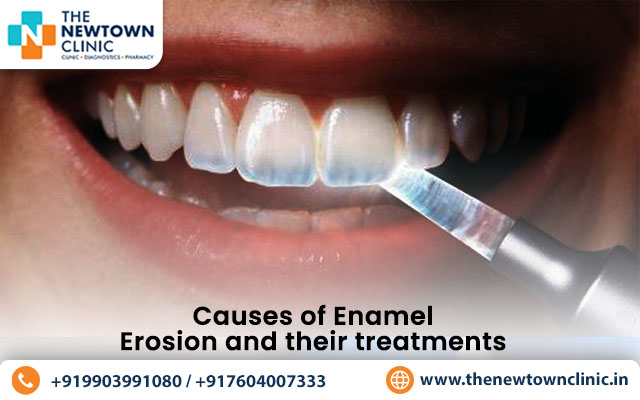Enamel erosion is a common dental problem that affects the protective outer layer of our teeth. Understanding its causes and available treatments is crucial for maintaining good oral health.
Causes of Enamel Erosion
1. Acidic diet: A diet high in acidic foods and beverages, such as citrus, sodas, and certain sweets, can contribute to enamel erosion. The acid present in these foods weakens the enamel over time, making teeth more susceptible to erosion.
2. Poor oral hygiene: Inadequate brushing and flossing allow harmful bacteria to thrive in the mouth. The bacteria that develops will erode the enamel, thus emphasising the importance of consistent oral care routines.
3. Dry mouth: Saliva plays a vital role in neutralising acids and protecting enamel. Conditions that reduce saliva production, like dry mouth, hinder this natural defence mechanism, leading to increased enamel vulnerability.
4. Gastrointestinal Issues: Individuals suffering from prolonged acid reflux or frequent vomiting expose their teeth to stomach acids, accelerating enamel erosion. If not treated at the earliest, gastrointestinal problems can cause severe damage to the dental enamel.
5. Bruxism (Teeth grinding): Bruxism is a condition in which a person grinds their teeth unconsciously, leading to wearing down of the enamel over time. Addressing bruxism through dental interventions, such as mouth guards, will help mitigate the risk of enamel erosion.
6. Genetics: Some individuals may be more predisposed to weaker enamel, making them more susceptible to erosion even with proper oral care.
Treatments for Enamel Erosion
1. Fluoride treatments: Fluoride treatments strengthen enamel by enhancing resistance to acid attacks.
2. Dietary changes: A Dentist from a dental clinic in Newtown recommends adjusting the diet to reduce acidic intake. Consuming more alkaline foods, dairy products, and water can help balance the pH levels in the mouth, promoting enamel health.
3. Proper oral hygiene: Using a soft-bristled toothbrush to regularly brush your teeth with fluoride toothpaste is fundamental for preventing enamel erosion. Moreover, the doctor might recommend using saliva stimulants. Increasing saliva flow helps protect enamel and maintain a healthier oral environment.
4. Dental Sealants: Sealants act as a protective barrier, preventing acids and bacteria from directly affecting the enamel. This preventive measure is particularly beneficial for vulnerable areas prone to erosion.
5. Restorative procedures: In case of significant enamel loss, restorative dental procedures like bonding or crowns may be necessary to restore the structure and functionality of the tooth.
6. Regular dental check-ups: Routine dental visits are essential for early detection of enamel erosion. Early detection is the key to treatment and recovery.
Enamel erosion is a serious medical condition that requires proper treatment. Adopting these measures, and consulting with an experienced dentist in Newtown, will help you maintain your oral health and prevent tooth decay.

